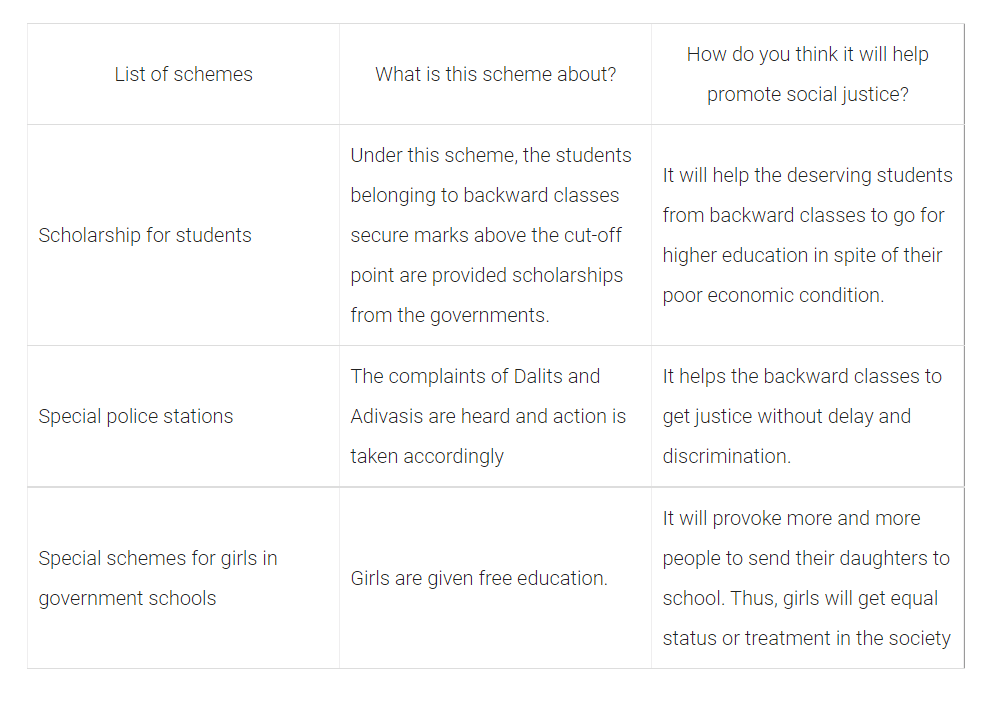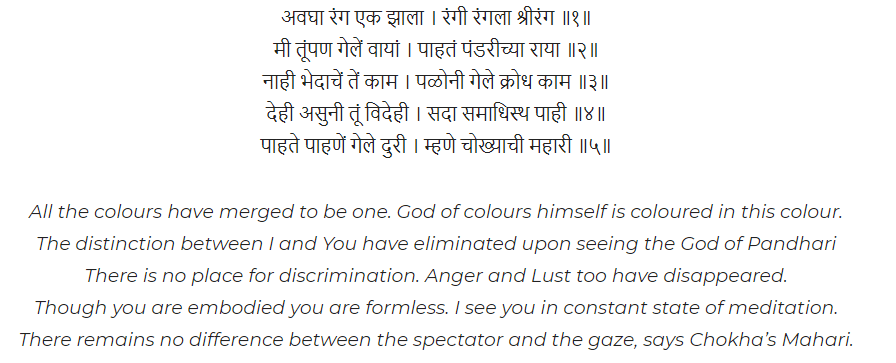Civics - Class 8
Social and Political Life - III
Chapter 8: Confronting Marginalisation
Intext Questions:
Question 1: State one reason why do you think reservations play an important role in providing social justice to Dalits and Adivasis?
Answer : Reservations play an important role in providing social justice to Dalits and Adivasis because it is the only way to restore their dignity and to make them join in the mainstream of national life.
Question 2: Fill in the blanks

Answer :

Question 3: In your opinion does the force put on Rathnam to perform this ritual violate his Fundamental Rights?
Answer : The force put on Rathnam to perform the ritual of washing the feet of all the priests and then bathing in the water used for this do violate their Fundamental Rights.
Question 4: Why do you think that Dalit families were afraid of angering the powerful castes?
Answer :
The Dalit families were afraid of angering the powerful castes because :
- Many of them worked on the fields of the people who belong to powerful castes as daily-wage labourers.
- They were afraid if dominant castes did not allow them to work in their fields then what would they (Dalit families) earn.
- Dalits also declared that the wrath of the local deity would strike them if they refused to give in.
Question 5: Can you list two different provisions in the 1989 Act?
Answer : Two different provisions in the 1989 Act are as follows :
(1) The Act sets out to punish anyone who wrongfully occupies or cultivates any land owned by, or allotted to a member of a Scheduled Caste or a Scheduled Tribe or gets the land allotted to him transferred.
(2) The Act recognizes that crimes against Dalit and tribal women are of a specific kind. It penalizes those who assault or use force on any woman belonging to a Scheduled Caste or a Scheduled Tribe with intent to dishonour her.
Question 6: Look up the glossary and write in your own words what you understand by the term ‘morally reprehensible’.
Answer :
Morally reprehensible means doing a task or an act which is not socially acceptable.
Or
Behaving or acting in such a manner which are against the morals and norms fixed by society.
Question 7: What do you understand by manual scavenging?
Answer : Manual scavenging refers to the practice of removing human and animal waste/ excreta using brooms, tin plates, and baskets from dry latrines and carrying it on the head to disposal grounds some distance away.
Question 8: Re-read the list of Fundamental Rights provided on page 14 (of the textbook) and list two rights that this practice violates?
Answer :
The practice of manual scavenging violates the following Fundamental Rights :
Right to Equality
Right to Freedom
Question 9: Why did the Safai Karamchari Andolan file a PIL in 2003? What did they complain about in their petition?
Answer : In 1993 the government passed the Employment of Manual Scavengers and Construction of Dry Latrines (Prohibition) Act. This law prohibits the employment of manual scavengers as well as the construction of dry latrines.
In 2003 the Safai Karamchari Andolan and 13 other organisations and individuals, including seven scavengers filed a PIL in the Supreme Court. The petitioners complained that manual scavenging still existed and was continued in government undertakings like the railways.
Question 10: What did the Supreme Court do on hearing their case in 2005?
Answer : The Supreme Court on hearing their case in 2005 directed every department/ ministry of the union government and state governments to verify the facts within six months. If manual scavenging was found to exist then the government department has to actively take up a time-bound programme for their liberation and rehabilitation.
Exercises
Question 1: List two Fundamental Rights in the Constitution that Dalits can draw upon to insist that they be treated with dignity and as equals. Re-read the Fundamental Rights listed on page 14 to help you answer this question.
Answer :
Two Fundamental Rights that Dalits can draw upon to insist that they be treated with dignity and as equals are: Right to Equality and the Right to Freedom.
Question 2: Re-read the story on Rathnam as well as the provisions of the 1989 Scheduled Castes and Scheduled Tribes (Prevention of Atrocities) Act. Now list one reason why you think he used this law to file a complaint.
Answer : The 1989 Scheduled Castes and Scheduled Tribes (Prevention of Atrocities) Act was formed in response to the demands made by Dalits and others that the Government take seriously to protect them against the ill-treatment and humiliation faced by Dalits and tribal groups in their everyday life.
Rathnam’s hut was burnt and he was forced to leave the village along with his mother and other members of his family as they continued to be ostracized by the powerful castes in the village. So Rathnam used the above law to file a complaint to protest against the domination and violence of the powerful castes in his village.
Question 3: Why do Adivasi activists, including C.K. Janu, believe that Adivasis can also use this 1989 Act to fight against dispossession? Is there anything specific in the provisions of the Act that allows her to believe this?
Answer :
- The Adivasi activists including C.K. Janu believe that Adivasis can also use this 1989 Act to fight against dispossession because this Act guarantees the tribals not to be dispossessed from the land resources forcibly.
- They pointed specifically that this Act merely confirms what has already been promised to the tribal people in the Constitution that their land cannot be sold to or bought by non-tribal people.
- In cases where this has happened, the constitution also guarantees that the right of the tribal people to repossess their land.
Question 4: The poems and the song in this Unit allow you to see the range of ways in which individuals and communities express their opinions, their anger and their sorrow. In class, do the following two exercises:
(a) Bring to class a poem that discusses a social issue. Share this with your classmates. Work in small groups with two or more poems to discuss their meaning as well as what the poet is trying to communicate.
Answer :

Poem by soyarabai. She, herself belong to the Mahar caste. In her esteemed poem, she questioned the discrimination.
(b)Identify a marginalised community in your locality. Write a poem, or song, or draw a poster etc to express your feelings as a member of this community.
Answer :
- Women
- People with disabilities
- Schedule Castes(Dalits)
- Scheduled Tribes
- Elderly or Aged People
- Children
- Sexual Minorities
POEM
you can find him folded into life's hidden pockets
a side note to the attention seekers
he is a wallflower
sprouting out of a stereo
music helps him grow
he dances in the margins like sketched vines
permanent yet silent
assimilating so well
you barely notice his presence
but in this moment
he is infinite
subtlety infinite
a dull bass at a roaring party
you may not sea him
but he is the land that keeps you steady